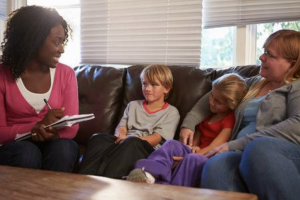 How does DCF affect your divorce?
How does DCF affect your divorce?
Divorce can be an intense, stressful process, especially if there are children involved. In some situations, there may be allegations of abuse or neglect by a parent on a minor child or children. Though any allegations of this nature are serious, there must be actual evidence that the child or children were abused and/or neglected by the parent.
Because of this, most divorce cases involving allegations of this sort result in involving the Massachusetts Department of Children and Families, or DCF for short. DCF’s goal is to protect the welfare and safety of the child and or children. In response to the allegations, DCF will investigate the situation. Here’s a look at how this process works and how the results can affect a divorce case in Massachusetts:
In Massachusetts, if there is a suspicion of abuse and or neglect of a child that person reports it to DCF. The reporter is either a mandated reporter (such as teachers, doctors, police officers, daycare workers, social workers, etc…) or a non-mandated reporter (such as the other parent, neighbor, relative, etc…).
Once DCF receives the report, a DCF worker gets assigned to the case to conduct an initial investigation to determine whether the allegation should be supported and screened-in or if the allegation should not be supported and screened out. This report is called a “51A”. A screened-out case means that the evidence did not show abuse and or neglect and DCF will close the case.
A screened-in case means that there is evidence to support the allegation of abuse or neglect and DCF will start a more in-depth investigation. This in-depth investigation is called a “51B”.
If your case is screened in, a social worker will be assigned to your case. The social worker will conduct a home visit, speak with you, speak with the child or children, speak with the child’s teachers, doctors, and any other caregivers in order to get a complete picture of the child or children’s care.
If the allegation is against you, you will want to consider having an attorney, friend, or family member present during the home visit for support. Everything you say to a DCF worker is being recorded in some fashion and can be used for and or against you.
The social worker will want to discuss the allegation(s) with you in more detail, observe your home, and observe your interactions with your child(ren). The social worker will also discuss the allegations with the child’s teachers, doctor(s), or anyone else that may have relevant and helpful information that will assist her/him to complete their investigation.
Once the DCF social worker completes their investigation, a recommendation from DCF follows. Typically the recommendation will include a service plan for the parties to follow. Once the service plan has been completed and there are no concerns for abuse and or neglect remaining, DCF will close the screened-in case.
If DCF is involved with your family, you have a right to receive a copy of the DCF records and report. You may request a copy of the records from the DCF regional office that your case is assigned to. The judge in your case will likely order the DCF social worker to appear at court hearings, testify, and produce copies of the DCF records. The judge will review the DCF records and ask for recommendations from the DCF social worker.
Counsel for the parties are permitted to review the DCF records and under certain circumstances may receive a copy of the DCF records. If the Court appoints counsel for the child or a Guardian Ad Litem, counsel for the child or the Guardian Ad Litem, may also be permitted to review and receive a copy of the DCF records.
Since it is vital children in these situations are protected at all costs, the court will place great emphasis on the findings of the DCF. Their conclusion, along with any unbiased evidence submitted by the parent making the allegations, can often turn a case in one direction or another very quickly. However, as with all divorce cases involving children, ultimately it is what will be best for the children in the short and long-term that prompts the court to make its decision.
For exceptional assistance with your allegations of abuse or neglect, and any aspect of your divorce or family law matter, contact the knowledgeable and experienced attorneys at Karpenski & Schmelkin, Divorce and Family Law Attorneys for more information.